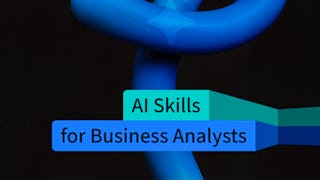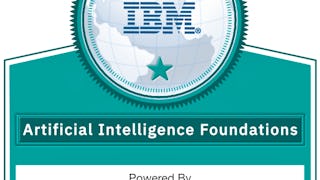- Browse
- Human Computer Interaction
Human Computer Interaction Courses
Human Computer Interaction courses can help you learn user interface design, usability testing, interaction design principles, and accessibility standards. You can build skills in user research, prototyping, and evaluating user experiences across various platforms. Many courses introduce tools like Figma, Sketch, and Adobe XD, that support creating and testing interfaces, along with methods for gathering user feedback and iterating on designs.
Popular Human Computer Interaction Courses and Certifications
 Status: Free TrialFree TrialD
Status: Free TrialFree TrialDDuke University
Skills you'll gain: Debugging, Java, Algorithms, Java Programming, Program Development, Programming Principles, Statistical Analysis, Software Design, Computer Programming, Data Import/Export, Integrated Development Environments, File I/O, Data Processing, Software Documentation, Data Manipulation, Object Oriented Programming (OOP), API Design, Data Analysis, Software Testing, Problem Solving
4.6·Rating, 4.6 out of 5 stars8.1K reviewsBeginner · Course · 1 - 3 Months
 Status: Free TrialFree TrialC
Status: Free TrialFree TrialCCalifornia Institute of the Arts
Skills you'll gain: Typography, Design Elements And Principles, Graphic Design, Graphic and Visual Design Software, Design, Logo Design, Digital Design, Layout Design, Color Theory, Image Quality, Photo Editing, Creativity
4.8·Rating, 4.8 out of 5 stars18K reviewsBeginner · Course · 1 - 3 Months
 Status: Free TrialFree TrialU
Status: Free TrialFree TrialUUniversity of California, Davis
Skills you'll gain: Social Network Analysis, Network Analysis, Data Wrangling, Natural Language Processing, Web Scraping, Social Sciences, Data Ethics, Databases, Artificial Intelligence, Research, Simulations, Data Processing, Big Data, Systems Thinking, Social Studies, Trend Analysis, Data Science, AI Enablement, Research Methodologies, Agentic systems
4.6·Rating, 4.6 out of 5 stars1.2K reviewsBeginner · Specialization · 3 - 6 Months
 Status: NewNewStatus: Free TrialFree Trial
Status: NewNewStatus: Free TrialFree TrialSkills you'll gain: Prompt Engineering, Prompt Patterns, ChatGPT, Generative AI, Responsible AI, Business Analysis, Data-Driven Decision-Making, Data Analysis, AI Enablement, Data Storytelling, Artificial Intelligence, Business Process Automation, Stakeholder Communications, Prototyping, Artificial Intelligence and Machine Learning (AI/ML), AI Workflows, Deep Learning, Business Strategy, Machine Learning, Context Management
4.7·Rating, 4.7 out of 5 stars11K reviewsBeginner · Specialization · 1 - 3 Months
 Status: Free TrialFree TrialU
Status: Free TrialFree TrialUUniversity of Michigan
Skills you'll gain: Database Design, SQL, MySQL, PHP (Scripting Language), Relational Databases, JSON, jQuery, Hypertext Markup Language (HTML), Javascript and jQuery, Ajax, Databases, Data Modeling, Database Application, Database Development, Debugging, Web Applications, Object Oriented Programming (OOP), Web Development, Secure Coding, Javascript
4.7·Rating, 4.7 out of 5 stars9.3K reviewsIntermediate · Specialization · 3 - 6 Months
 Status: Free TrialFree Trial
Status: Free TrialFree TrialSkills you'll gain: Prompt Engineering, Prompt Patterns, ChatGPT, Generative AI, Responsible AI, IBM Cloud, AI Workflows, Workflow Management, No-Code Development, Machine Learning Software, Model Deployment, Natural Language Processing, Machine Learning, Artificial Intelligence, Self Service Technologies, Application Deployment, Prototyping, Artificial Intelligence and Machine Learning (AI/ML), Deep Learning, Data Science
4.7·Rating, 4.7 out of 5 stars35K reviewsBeginner · Specialization · 3 - 6 Months
 S
SScrimba
Skills you'll gain: User Interface (UI) Design, Color Theory, Typography, Web Design, Design, Usability, HTML and CSS, Design Elements And Principles, Layout Design
4.8·Rating, 4.8 out of 5 stars17 reviewsIntermediate · Course · 1 - 4 Weeks
 Status: NewNew
Status: NewNewSkills you'll gain: LangChain, Prompt Engineering, LLM Application, AI Workflows, Generative AI Agents, Front-End Web Development, Context Management, Data Integration, Application Deployment
Intermediate · Course · 1 - 4 Weeks
 Status: Free TrialFree Trial
Status: Free TrialFree TrialSkills you'll gain: Storyboarding, Wireframing, Information Architecture, Figma (Design Software), User Experience Design, User Centered Design, Prototyping, User Interface (UI), Usability, Mockups, Conceptual Design, User Flows
4.9·Rating, 4.9 out of 5 stars9.6K reviewsBeginner · Course · 1 - 4 Weeks
 Status: Free TrialFree TrialU
Status: Free TrialFree TrialUUniversity of California San Diego
Skills you'll gain: Unit Testing, Growth Mindedness, Data Structures, Graph Theory, Event-Driven Programming, Social Network Analysis, Interactive Data Visualization, Java, Java Programming, Network Analysis, Object Oriented Programming (OOP), Technical Communication, User Interface (UI), JUnit, Object Oriented Design, Computer Programming, Adaptability, Performance Tuning, Algorithms, Problem Solving
4.7·Rating, 4.7 out of 5 stars7.2K reviewsIntermediate · Specialization · 3 - 6 Months
 Status: Free TrialFree Trial
Status: Free TrialFree TrialSkills you'll gain: Figma (Design Software), User Experience Design, Mockups, User Centered Design, Usability Testing, User Interface (UI) Design, Design Elements And Principles, Interaction Design, Prototyping, Technical Communication, Typography, Layout Design, Animations, Color Theory
4.8·Rating, 4.8 out of 5 stars4.8K reviewsBeginner · Course · 1 - 3 Months
 Status: Free TrialFree Trial
Status: Free TrialFree TrialSkills you'll gain: Cloud Deployment, CI/CD, Open Web Application Security Project (OWASP), Continuous Integration, Istio, Agile Software Development, Application Deployment, Test Driven Development (TDD), Kubernetes, Gherkin (Scripting Language), Jenkins, Code Coverage, OpenShift, Cloud Applications, Agile Methodology, Behavior-Driven Development, DevOps, Secure Coding, Grafana, System Monitoring
Build toward a degree
4.7·Rating, 4.7 out of 5 stars7.9K reviewsIntermediate · Professional Certificate · 3 - 6 Months
Searches related to human computer interaction
In summary, here are 10 of our most popular human computer interaction courses
- Java Programming: Solving Problems with Software: Duke University
- Fundamentals of Graphic Design: California Institute of the Arts
- Computational Social Science: University of California, Davis
- Generative AI for Business Analysts: IBM
- Web Applications for Everybody: University of Michigan
- AI Foundations for Everyone: IBM
- Learn UI Design Fundamentals: Scrimba
- Building Smart Chatbots with LangChain: Packt
- Build Wireframes and Low-Fidelity Prototypes: Google
- Object Oriented Java Programming: Data Structures and Beyond: University of California San Diego










